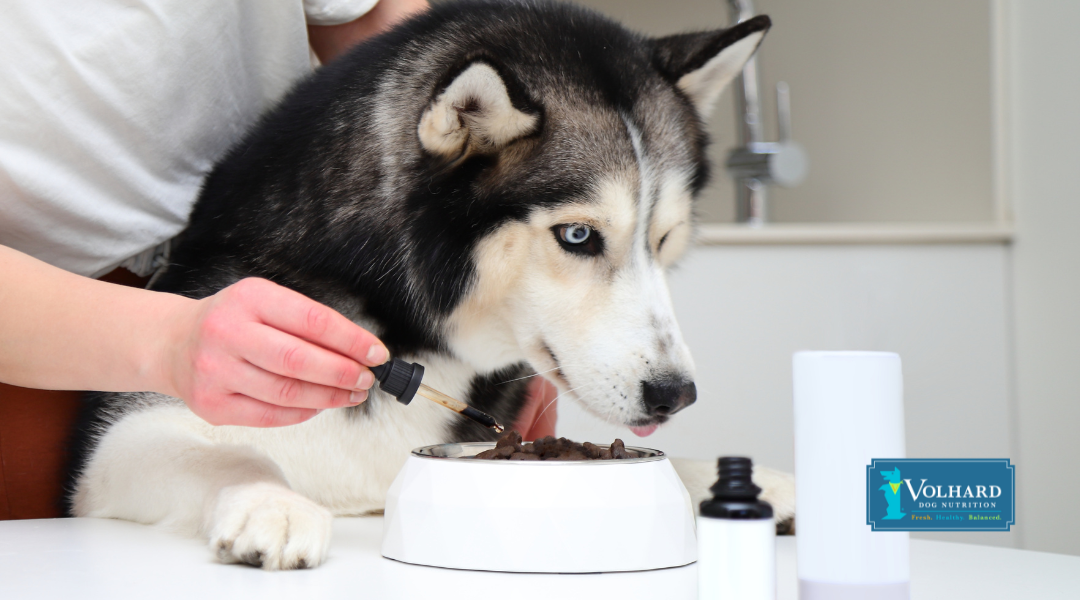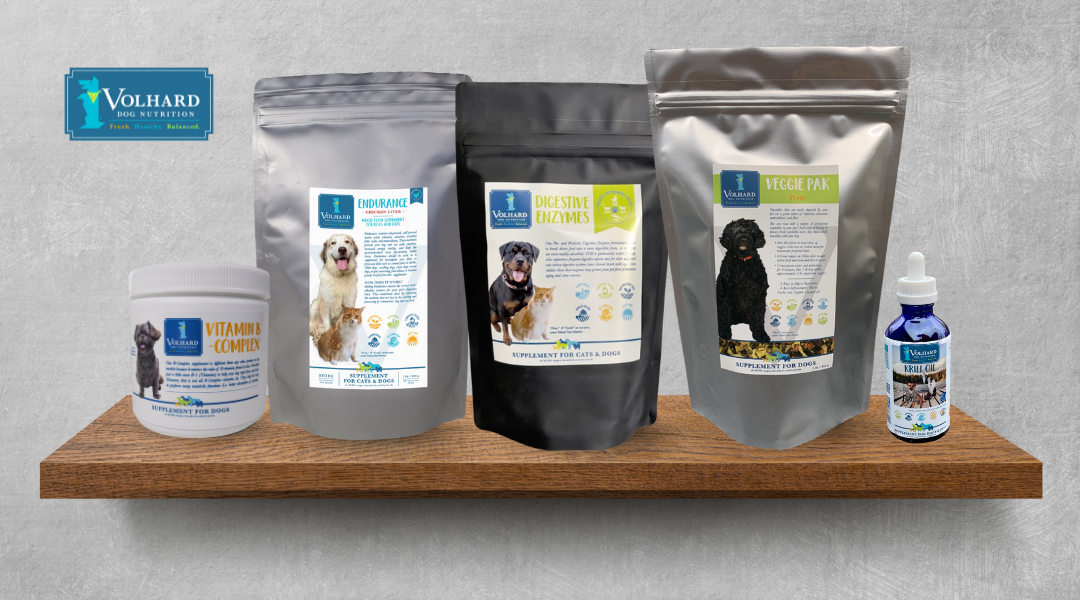The Supplement Trap: When Your Dog Actually Needs Extra Nutrients (And When They Don't)
Posted by Volhard Dog Nutrition on Oct 20th 2025
Walk into any pet store or browse online, and you’ll be met with shelves of powders, pills, and oils all claiming to give your dog “optimal health.” With so many options, it’s easy to wonder: Does my dog actually need all these supplements, or are they already getting everything from their food?
The truth is, not every dog needs additional nutrients. In fact, over-supplementing can sometimes do more harm than good, leading to imbalances, or digestive upset.
There are times when the right supplement can genuinely support your dog’s health, whether they’re a high-energy working dog, a senior with age-related needs, or a pup with a sensitive stomach.
We’ll break down when supplements are beneficial, when they’re unnecessary, and how to make informed choices based on your dog’s individual diet, lifestyle, and medical needs. Our goal is simple: to help you avoid the supplement trap and give your dog exactly what they need, no more, no less.
Understanding the Basics of Canine Nutrition
A dog’s nutritional needs are best met through a balanced, species-appropriate diet that provides protein, healthy fats, vitamins, and minerals in the right proportions. When meals are thoughtfully formulated, they already cover the majority of what your dog requires to thrive.
Supplements should never be used to “patch up” a poor diet, they are meant to complement an already solid foundation. Just as in human health, balance is key: too little of a nutrient can cause deficiencies, but too much can create imbalances that harm rather than help.

When Supplements Can Truly Benefit Your Dog
Dogs with medical conditions or special needs often benefit from targeted supplementation. For example, pups with digestive sensitivities may do better with added enzymes to help break down food more efficiently, while those with joint issues may find relief with omega-3s. In these cases, supplementation supports areas where the body is struggling to keep up.
Active and working dogs that burn extra energy may also require more than diet alone can provide. Dogs that compete in agility, serve as hunting companions, or simply live very high-energy lifestyles often need added nutritional support for stamina, recovery, and muscle maintenance. Products designed to replenish these reserves can make a meaningful difference in performance and well-being.
Senior dogs and age-related nutritional gaps represent another group that benefits from supplements. As dogs age, their metabolism changes, absorption becomes less efficient, and joint or cognitive issues can appear. Thoughtful supplementation, such as B vitamins for energy and brain health or omega-3s for inflammation, can help older pets maintain their vitality and comfort well into their golden years.
When Supplements Are Unnecessary (or Even Harmful)
It’s important to recognize that not all dogs need supplements, and in some cases, giving them can do more harm than good. Over-supplementing can lead to nutrient toxicity, digestive upset, or interference with the body’s natural balance. For instance, too much calcium can put stress on growing puppies’ bones, and excess fat-soluble vitamins can accumulate in the body to dangerous levels.
Pet parents should also be wary of marketing myths that mislead. Many products claim to be “essential” when, in reality, a well-formulated diet already delivers what your dog requires. Buying into every new trend may not only waste money but could also introduce unnecessary risks. Being a savvy consumer means separating hype from genuine need.
How to Make Informed Supplement Choices
The best approach to supplementation is thoughtful and intentional. Start by reading labels carefully, look for clear ingredient lists, whole-food sources, and transparent explanations of what each component does. Avoid vague “proprietary blends” that mask what’s really inside.
When in doubt, remember that quality matters more than quantity. A single, high-quality supplement targeted to your dog’s unique needs is more effective than piling on multiple products.
Whole-food based options, like blends of vegetables, omega-rich oils, or carefully balanced vitamin complexes, tend to be easier for the body to absorb and gentler on the digestive system.
And most importantly, involve your veterinarian in the decision-making process. They can help you identify whether your dog has a genuine gap to fill or if their diet already provides the nutrients they need.

Spotlight on Smart Supplementation
Endurance : Fueling Active & Working Dogs
Why Athletes and High-Energy Dogs Benefit From Extra Nutrients
Not all dogs have the same nutritional demands. High-energy companions, whether they’re agility competitors, hunting dogs, working breeds, or simply very active family members, burn through their reserves faster than the average pup. These dogs require extra nutritional support to keep their bodies performing at their best. Volhard’s Endurance formula was created with this in mind, offering targeted nutrients that help replenish energy stores, protect against oxidative stress, and maintain optimal performance levels.
Supporting Stamina, Recovery, and Joint Health
Beyond energy, performance dogs face the strain of repetitive movement and physical stress. Endurance is packed with whole-food vitamins, minerals, and antioxidants that aid in quicker muscle recovery, reduce inflammation, and protect joints from long-term wear. By nourishing the body before, during, and after activity, this supplement helps dogs recover faster, stay active longer, and enjoy their favorite activities without discomfort.
Vitamin B Complex: Everyday Support for Nervous System & Energy
When Stress, Illness, or Age Calls for Extra B Vitamins
B vitamins play a critical role in maintaining the nervous system, supporting metabolic processes, and producing energy at the cellular level. During periods of stress, illness, or aging, the body can burn through these vitamins more quickly, leaving dogs feeling sluggish or out of balance. Supplementing with Volhard’s Vitamin B Complex Powder helps bridge that gap, ensuring dogs receive the steady supply of B vitamins needed for resilience and recovery.
Why a Simple Boost Can Help With Vitality
Adding a B vitamin complex to your dog’s diet can make a noticeable difference in energy levels, appetite, and overall well-being. Beyond boosting energy, B vitamins help with red blood cell formation, proper digestion, and even coat quality. Whether your dog is recovering from a health challenge, showing signs of age-related slowdown, or simply needs extra support during stressful transitions, this simple daily addition provides a safe, effective way to maintain vitality and balance.
Veggie Pak: Filling the Phytonutrient Gap
Getting the Rainbow of Nutrients When Diets Fall Short
Even with a balanced base diet, it can be difficult to consistently provide the full spectrum of phytonutrients that come from fresh vegetables. Dogs benefit from these vitamins, minerals, and plant compounds just as humans do, they help support the immune system, aid in detoxification, and provide natural antioxidants. Volhard’s Veggie Pak is designed to bridge that gap, ensuring dogs receive the “rainbow” of nutrition their bodies crave.
Whole-Food Vegetables in a Convenient Blend
What makes Veggie Pak stand out is its use of real, whole-food ingredients, dehydrated at peak ripeness to preserve maximum nutrient density. This convenient blend allows pet parents to add variety and vitality to their dog’s bowl without the hassle of prepping and chopping vegetables daily. It’s an easy, effective way to give dogs the benefits of fresh produce, no matter the season or schedule.
Digestive Enzymes: Supporting a Healthy Gut
When Digestive Aid Is Needed (Sensitive Stomachs, Transitioning Diets)
A healthy digestive system is the cornerstone of overall wellness. But for dogs with sensitive stomachs, food intolerances, or those transitioning to a new diet, digestion can become a challenge. Volhard’s Digestive Enzymes make a difference, offering targeted support to break down proteins, fats, and carbohydrates so the body can process food more comfortably.
Promoting Better Absorption of Nutrients Already in the Food
By improving how food is broken down and absorbed, digestive enzymes ensure dogs get the most out of every bite. This means fewer undigested nutrients passing through the system and more bioavailable nutrition fueling the body. For dogs struggling with gas, bloating, or inconsistent stools, digestive enzymes can provide the relief they need, while maximizing the benefits of a balanced diet.
Krill Oil: Omega-3s for Skin, Coat, and Joints
Why Most Dogs Can Benefit From Extra Omega-3 Fatty Acids
Omega-3 fatty acids are essential nutrients that many dogs simply don’t get enough of from diet alone. They play a vital role in maintaining heart health, supporting cognitive function, and nourishing the skin and coat. Volhard’s Krill Oil offers a highly bioavailable source of omega-3s, making it easier for dogs to absorb and use these powerful nutrients.
Reducing Inflammation and Supporting Longevity
Beyond everyday wellness, omega-3s are known for their anti-inflammatory properties, which help ease joint discomfort, support mobility, and protect against chronic conditions. By reducing systemic inflammation, Krill Oil not only helps dogs feel more comfortable but also promotes long-term vitality and longevity. From shiny coats to improved joint flexibility, this supplement delivers benefits dogs (and their humans) can see and feel.

Practical Tips for Pet Parents
6 Signs Your Dog May Need Extra Help
- Low or inconsistent energy – Your dog seems more tired than usual or struggles to keep up with activities they once enjoyed.
- Dull or brittle coat – Lack of shine or excessive shedding may signal missing nutrients.
- Recurring digestive upset – Gas, bloating, loose stools, or difficulty transitioning to new foods can indicate the need for digestive support.
- Slow recovery after exercise – Active or working dogs that take longer to bounce back may benefit from added nutrients.
- Health challenges – Dogs dealing with stress, chronic illness, or the natural effects of aging often need extra support.
- Veterinary recommendations – A vet-identified deficiency or condition requiring targeted nutrients.
5 Signs Your Dog May Not Need Supplements
- Shiny, healthy coat – A good indicator that your dog’s diet is providing the right balance of fatty acids and nutrients.
- Steady energy levels – Your dog remains active and engaged without signs of fatigue or sluggishness.
- Healthy weight – Consistent body condition without unexplained weight gain or loss.
- Strong digestion – Regular, well-formed stools and no recurring stomach issues.
- Overall vitality – Bright eyes, alertness, and enthusiasm for daily activities signal that their needs are being met naturally.
Give Your Dog the Right Support With Volhard Nutrition!
For more advice on dog nutrition, health, and training, contact us and check out our other blogs!
Volhard Dog Nutrition and its expert canine nutrition coaches offer online consultations to help more dog parents discover why and how to feed their dogs the healthiest foods!
Speaking to a Volhard canine nutrition coach can help you understand the inseparable relationship between healthy food, a healthy body, and a healthy mind.
If you want to contact one of our Volhard canine nutrition coaches, don't hesitate to send us a message through our LiveChat feature or schedule a personalized consultation!
References:
Finno, Carrie J. "Veterinary Pet Supplements and Nutraceuticals." Nutrition Today, vol. 55, no. 2, 2020, pp. 97–101. PubMed Central, https://www.ncbi.nlm.nih.gov/pmc/articles/PMC7802882/.
Gamble, Lara J., et al. "Canine Nutritional Supplements for Joint Health: A Review of Efficacy and Safety." Journal of Veterinary Internal Medicine, vol. 26, no. 2, 2012, pp. 448-456. PubMed, https://pubmed.ncbi.nlm.nih.gov/22616443/.
Jackson, Harley A., and Karen K. Hall. "Use of Nutritional Supplements in Dogs: Benefits and Risks." Veterinary Clinics of North America: Small Animal Practice, vol. 50, no. 2, 2020, pp. 351-370. PubMed, https://pubmed.ncbi.nlm.nih.gov/20043800/.
Eukanuba. "Dog Nutrition: Tips and Products for a Healthy Dog." Eukanuba South Africa, 2025, https://www.eukanuba.com/za/?gad_source=1&gad_campaignid=22363479070&gbraid=0AAAAABU_1lrltnirDCfhxV6lhihmYq2dM.
Miller, Kate. "All About Digestive Enzymes for Dogs." PetMD, 2025, https://www.petmd.com/dog/nutrition/all-about-digestive-enzymes-dogs.
Poppenga, Robert H. "Toxicoses in Animals from Human Multivitamins and Supplements." Merck Veterinary Manual, 2025, https://www.msdvetmanual.com/toxicology/toxicoses-from-human-vitamins-minerals-and-dietary-supplements/toxicoses-in-animals-from-human-multivitamins-and-supplements.


